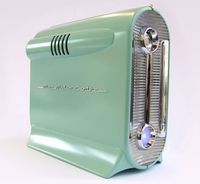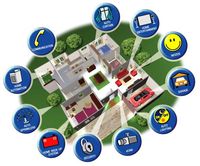
They haven't. The PC has been dieing for years. As a client.
But as a server? Not so much.
I know that the long-term talk about “media servers” has proven to be a dead end. I'm talking about an opportunity that has existed for nearly a decade, which I first began labeling “the world of always-on.”
I'm talking of single-chip, specialty devices that can provide automation, security, inventory and medical services to our aging population.
-
Devices placed in-line with lights, kitchen appliances, and any other system which uses energy, which can monitor the conditions of those devices, turning them on-and-off in response to a program.
-
Single-chip cameras that can be turned on remotely, or via a program, to provide constant security.
-
RFID chips placed on goods and even foodstuffs that can monitor the inventory and location of what you got.
-
Medical devices that can monitor and report on health without outside intervention.

That's where this new PC will live. It will be a server. Everything else – including keyboards, screens, and the rest of the PC panoply, becomes a wireless peripheral to this device.
It looks more like a home router than anything else. It's a single-board system with an operating system and an application stack dedicated to handling these automation functions securely. In fact, most of the storage and compute overhead in this device will be devoted to security.
We're overdue for this kind of thing. All the parts of a modern home have already been built – the single-chip controllers for devices, the small operating systems that enable them to live in the air, via WiFi, the “apps” that turn a phone or pad into an interface. The only thing that changes is that all the elements we now think of as a PC disappear from view.
Right now Apple is best-positioned to seize this opportunity, only their OSX computers are expensive, and they trail in the small OS space needed to access the client devices. Linux actually leads, not only because they have those interfaces but because they can also do virtualization, which is needed to abstract the operating system from the user, enabling any device to act as a controller, and any device to be controlled.
So here's 2018.
-
As you approach your apartment, you open the app that opens your door and reports on perimeter security.
-
As you wake up your toast and coffee are made for you, the yogurt tells you whether it's spoiled, and another app tells you if you need to get anything from the store to make that dinner you've been planning.
-
You know where every family member is because there's a centralized schedule, accessed through their phones, that can tell you what's expected during the day.
-
While you're at work your Netflix account will automatically download the movie you're watching tonight, the take-out dinner's delivery can be timed within a five-minute window, and you can check on your mother's condition (or your kids') at their day care center at any time.
-
They, and their care givers, can also contact you, as can the devices mom is wearing to monitor her health, and those the kids wear to monitor their safety.
-
Any deviation in routine generates an alert.
Computers can do all of this right now. What they lack is a central facility to handle the coordination, and device marketing to automate both the home and its contents.
Meanwhile we can work on getting that ZipCar to deliver you to your destination without your having to drive.

This is not an Orwellian nightmare. It's a dream, because it can all be done under your control, securely. It's all completely optional, sold to you as products and software-based services. Want to continue living your interrupt-riddled life, unable to find your keys, get a meal together, keep track of the kids by phone or text, and know that your home and stuff are secure? Go ahead.
But this is a mass market opportunity, bringing together a lot of technology trends – the PC's death as an appliance, the growth of sensor networks, the need for medical and security monitoring, the rise of powerful Internet clients that can control many types of devices, and virtualization.
All under your control.












acompanhantes rj
Dana Blankenhorn: The Big Opportunity in Home Servers